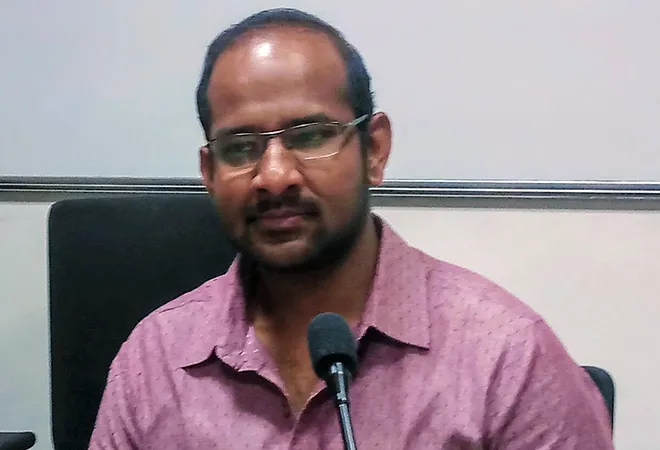-
CENTRES
Progammes & Centres
Location

“A drastic reduction of industrial footprint, by 60-70 percent is needed in order to mitigate the effects of climate-change in southern Tamil Nadu’s Nilgiris mountains, where only nine percent of the original grasslands remain,” according to Godwin Vasanth Bosco, Restoration Ecologist and Author.
Initiating a discussion on “Ecological consequences of climate -change: A Nilgiris and Global Forests Perspective” at Observer Research Foundation, Chennai, on 16 November 2019, Bosco said it was important not to fall into a trap of short-term alternatives, instead think in terms of long-term solutions. “Though afforestation and reforestation drives are invaluable,” Bosco explained, “the reduction of emission was far more important.”
According to Bosco, reducing carbon di-oxide (CO2) emissions was the key to mitigating climate change, more than simply planting more trees. In order to do so, we have to rethink economic development and crucially have to involve a drastic scaling down of industrial output. “Serious planning and assessment on how to achieve this reduction are needed,” he said.
Quoting from his book, Voice of a Sentient Highland, Bosco elaborated on the various ways in which scaling down of industrialisation can be widely beneficial, arguing that it can actually boost GDP rather than adversely impact on it. “One positive impact of scaling back industrial production is that we can generate employment. Second, there is always more value in hand made/hand crafted products. Such products that rely on human skill ultimately fetch higher prices,” he noted.
Bosco also felt that alternatives to fossil fuels were no longer useful, as they represented really small changes working in one direction, while the entire system was working in the opposite direction mitigating their impact. “Alternative technologies often have massive carbon footprint and therefore are not necessarily helpful,” he pointed out.
“These technologies require minerals, and the mining industry displaces forests as well as enslaves people. So, we need to consider long term impact and not focus narrowly on alternatives. Windmills for example need huge amounts of aluminium and copper.” Bosco also talked about research currently being undertaken whose focus is on the possibility of genetically modifying plants so that they can take higher CO2 levels from the air.
This too, the speaker believed, was a short solution. Other critics of geo-engineering have also pointed out the risks involved in such schemes which are the unintended and unpredictable consequences that have the potential to adversely impact ecosystems and communities.
Bosco believed in long-term solutions and more fundamental change, and for this he turned to the Nilgiris. The title of his most recent book, Voice of a Sentient Highland, was both a reference to what makes the Nilgiris special, and on the way forward. “Sentient means alive and intelligent. We need to rely on the intelligence of nature, all the answers are in nature,” he explained.
The Nilgiris can be seen as a microcosm of earth for various reasons, according to Bosco. What is most distinctive is the different vegetation types that are found there, “covering a tract of 5000 square km you can see rainforests, moist deciduous forests, dry deciduous forests, scrub jungle, as well as shola and grasslands. This level of diversity of vegetation is very rare and therefore very special” said Bosco.
Second, it is as a microcosm of earth due to the various ecological pressures on the Nilgiris. “It has almost every kind of ecological pressure in the world, such as tourism pressure, soil erosion, pollution, fires ground water pollution, invasive species and so on.”
Unfortunately, large portions of the forest have been cleared for tea plantations and this has severely altered the black soil that is special to the Nilgiris. During the colonial period, for reasons of homesickness and nostalgia, the British brought in new species such as eucalyptus which affected the growth of the native species. All of these problems were representative of the impact of Climate Change the world over, “forests all over the world are dying. Grasslands are choking. Ecosystems are not going to be able to withstand extreme weather conditions,” Bosco lamented.
What made the Nilgiris even more special was that it supported 30 different types of indigenous groups. Both as urban dwellers who by and large have a conflicting relation with nature, as well as those involved in policy making and policy analysis, we had much to learn from them, Bosco said. “Observing this region, we get an insight into the ideal co-existence of human and nature. The way indigenous people live is completely sustainable. They don’t deplete, degrade, denude.”
In terms of specific policy recommendations for moving forward, Bosco said, reducing industrialisation was the key and it would be widely beneficial, particularly in increasing GDP. Spreading awareness was also very important, he pointed out. Instead of undertaking short term measures in small isolated areas, it would be more beneficial if more people actually became aware of the real extent and consequences of climate change; and that way more people will be invested in long term solutions.
This report was prepared by Dr. Vinitha Revi, Research Associate, Observer Research Foundation, Chennai
The views expressed above belong to the author(s). ORF research and analyses now available on Telegram! Click here to access our curated content — blogs, longforms and interviews.